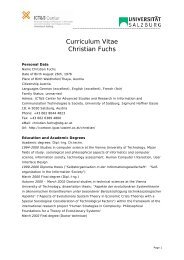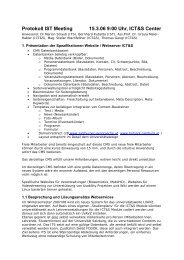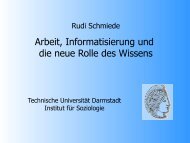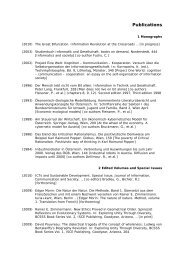ICTS AND SOCIETY: THE SALZBURG APPROACH - ICT&S
ICTS AND SOCIETY: THE SALZBURG APPROACH - ICT&S
ICTS AND SOCIETY: THE SALZBURG APPROACH - ICT&S
Create successful ePaper yourself
Turn your PDF publications into a flip-book with our unique Google optimized e-Paper software.
3.2.3 Tools of a Science of the Information Society<br />
ICTs and Society: The Salzburg Approach<br />
And since the investigation has to comprise as wide a range of matter as this, a<br />
science of the Information Society cannot, with reference to the third criterion,<br />
afford to neglect any methodological means of study which might be fruitful and<br />
elucidating. Likewise it must not fail in putting the puzzle of findings together and<br />
in synthesising the manifold analyses, thus transcending the borders of disciplines<br />
and aiming at the unity of science by a unifying approach without subjecting any<br />
thinking to uniformity. In that sense, a science of the Information Society is a<br />
science by means of Information Society – by means of making use of possibilities<br />
technologies of knowledge provide for getting access to, comparing and assessing<br />
an ever increasing variety of knowledge.<br />
3.3 Forerunners of a Science of the Information Society<br />
Historically, there are two main lines of scientific discussion, which are gradually<br />
becoming intertwined and may serve as a starting point for elaborating on a science<br />
for, about, and by means of, Information Society. First, there are a number of<br />
social theories which focus on diverse aspects of the emerging society. Second, it<br />
is no surprise that the so-called information theory and its development are also<br />
important in this context, for the concept of information is related to the concept<br />
of Information Society.<br />
3.3.1 Disciplinary Accounts<br />
The social-scientific accounts can be classified as follows: On the one hand, the<br />
historically earliest theories were those which offered an evolutionary perspective<br />
within a framework of theories of history like Tadeo Umesao's one in 1963, who<br />
postulated stages from agricultural production to material industry to information<br />
industry; McLuhan (1967) took for granted that by “an extension of the nervous<br />
system itself ... with circuitry” the Neolithic age gives way to an “electric age”, and<br />
Brzezinski (1968) spoke of a “technotronic age”, both having computers and communication<br />
technologies in mind; these theories are often formulated either in terms<br />
of the so-called “scientific-technological revolution” mainly in socialist countries (the<br />
famous Richta Report in 1966) or in oppositon to Marx’s thinking (Bell 1973, later<br />
followed by Toffler 1980), but all of them have a bias to technological determinism.<br />
On the other hand, there have been a number of generalisations of empirical findings<br />
and attempts to identify trends in societal development which were supposed<br />
to mark a qualitative change.<br />
The most famous approaches are trials to highlight changes in the structure of<br />
economy and in the division of labour which assume the emergence of an information<br />
sector and of information workers (Machlup 1962, Porat 1976, OECD/ICCP<br />
1981, OECD/ICCP 1985); a Japanese approach measures the information consump-<br />
Hofkirchner | Fuchs | Raffl | Schafranek | Sandoval | Bichler 16









